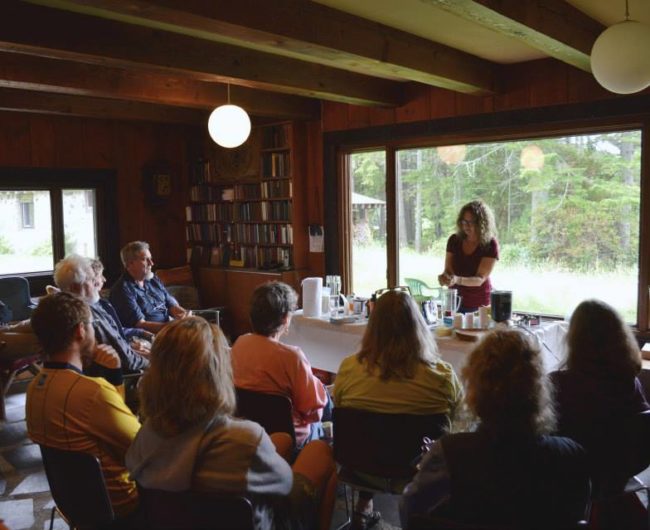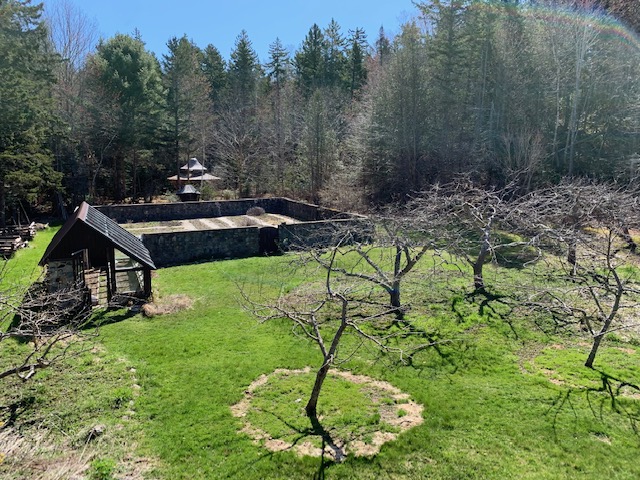The Good Life Center (original) (raw)

The mission of The Good Life Center is to perpetuate the legacy of Helen and Scott Nearing. The Good Life Center, through its programming and preservation of the historic Forest Farm homestead, advocates for simple and sustainable living skills, social and economic justice, organic gardening and the non-exploitation of animals.
Open Seasonally
From Labor day until Indigenous Peoples' Day Saturday & Sunday 1-5pm

Summer Speaker Series:
Free lectures Sundays at the Good Life Center.
Just before Helen died in 1995 she signed an agreement with the Trust for Public Land to take over the stewardship of her property upon her death, with the idea of keeping Forest Farm open to the public. Today the Good Life Center serves as a clearinghouse for the Nearings' publications, as a model of sustainable living practices, as a social justice center, and as a gathering place for a summertime Speaker Series, hands- on workshops, educational programs and volunteer work parties.
Join us Sundays at 4pm in the Summer. New Schedule Coming Soon!
The Forest Farm

Workshops
We are offering workshops again this Summer.
Keep an eye out for the new schedule coming soon!
Who were Scott and Helen Nearing?
"There were liberals, environmentalists and radicals who see them as pioneers of American socialism, as revolutionaries, as enemies of social injustice, and as godparents of the sustainable living and organic agriculture movement."
NEARING HISTORY AND PHILOSOPHY
Both Scott and Helen had fascinating lives before they began homesteading in the early 1930's. Helen was an expert violinist, who traveled to Amsterdam (her mother was Dutch) in the early 1920's to study with a master violinist, and to be part of the Theosophical Society in Europe. It was while she was in Holland that she met Krishnamurti, who would become a world-renown spiritual leader. Through her association with Krishnamurti and her involvement with the Theosophy movement, she spent much of the next several years traveling around the world. Scott was a noted economist who taught at the Wharton School at the University of Pennsylvania until 1915. He was well respected in his field and a book he wrote on economics was a standard text at the time. He was fired from his job at the Wharton School for his increasingly socialist and radical views, and due to his staunch opposition to child labor, a practice supported by some members of the business community who belonged to the school's board of trustees. After his dismissal he found a job teaching at the University of Toledo. He was fired from this position due to his pacifism and outspoken opposition to the U.S. involvement in World War I. In 1918 he was arrested for his views on the war and was put on trial. He defended himself and was ultimately acquitted. Throughout the 1920's, during the era of the first "red scare," Scott continued lecturing and writing, but was gradually blacklisted from mainstream publishers and lecture circuits for his strident anti-capitalist, pro-communist ideology. Scott and Helen's relationship as a couple began in the late 1920's. When they finally decided to begin their Vermont homestead in 1932, they were living in a rundown apartment in New York City.
The Nearing's primary reasons behind leaving New York City for the Vermont countryside were economic rather than aesthetic. Their goal was to attempt to free themselves as much as possible from the inequitable capitalist economic structure. They wanted to make a living through their own daily bread labor as opposed to working for hourly wages in the market economy. They also desired to make time each day for intellectual and artistic pursuits. In Vermont they used maple sugar as their cash crop and provided much of their food from the organic gardens they tended. They were generally opposed to animal exploitation, and as such were vegetarians and avoided the use of animal products in their gardens. Both the vegetarianism and the lack of animal products in the gardens- excepting stray seashells from seaweed - are still practiced by the resident stewards. The Nearings' appeal attracts people from a variety of backgrounds. There are conservatives who see in them the true embodiment of a powerful work ethic combined with strong individualism. There are liberals, environmentalists and radicals who see them as pioneers of American socialism, as revolutionaries, as enemies of social injustice, and as godparents of the sustainable living and organic agriculture movement.
Former manager and current board member, Warren Berkowitz
We acknowledge that the Good Life Center exists in the place we now call Harborside, Maine, which is home to the sovereign Wabanaki people. We honor and are grateful for the ancestral and contemporary Wabanaki peoples indigenous to this land in the Dawnland.